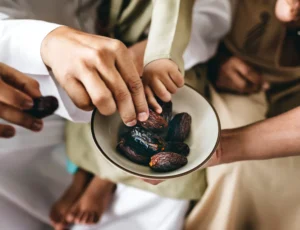Ramadan is not just a time for individual reflection and devotion; it is also an opportunity to strengthen family bonds. The month offers a unique environment that fosters unity, love, and understanding among family members. As we engage in acts of worship, it is essential to include our families in our spiritual journey to create a stronger, more connected household. Strengthening family relationships during Ramadan leads to long-term benefits, including better communication, deeper love, and shared spiritual growth.
In Case You Missed It:
Ramadan Preparation Guide: How to Maximize Your Worship (Part 1)
Ramadan Preparation Guide: Strengthening Your Relationship with the Quran (Part 2)
Ramadan Preparation Guide: Maximizing Your Worship Through Salah and Dhikr (Part 3)
Ramadan Preparation Guide: Fasting with Sincerity and Gratitude (Part 4)
Ramadan Prep: Charity and Helping Others (Part 5)
Ramadan Prep: The Power of Dua and Seeking Forgiveness (Part 6)
1. Eating Suhoor and Iftar Together
One of the most beautiful aspects of Ramadan is gathering as a family for suhoor (pre-dawn meal) and iftar (meal to break the fast). The Prophet Muhammad (SAW) said:
“Eat suhoor, for in suhoor there is blessing.” (Bukhari & Muslim)
Sharing meals fosters love and strengthens the bond between family members. It is an opportunity to encourage each other in worship and discuss the importance of fasting. Studies have shown that eating together as a family improves communication and emotional connection.
Tips for Meaningful Family Suhoor & Iftar:
- Assign different family members tasks to prepare meals together.
- Use meal times to share reflections on the Quran and Hadith.
- Encourage children to make simple duas before breaking the fast.
- Discuss personal spiritual goals and support each other.
- Create a family gratitude journal where each member can write what they are thankful for each day.
2. Praying Together as a Family
Ramadan is the perfect time to establish or strengthen the habit of praying together as a family. The Prophet (SAW) said:
“The best prayer after the obligatory prayer is the night prayer (Tahajjud).” (Muslim)
Praying together increases love, unity, and accountability within the household. Family members who pray together are more likely to encourage each other in worship beyond Ramadan.
Ways to Encourage Family Prayer:
- Pray at least one of the five daily prayers in congregation at home.
- Perform Taraweeh prayers together, even if at home.
- Encourage children to lead certain prayers to boost their confidence.
- Make dua together after prayers, asking for blessings for the family.
- Establish a prayer corner at home to create a peaceful atmosphere for worship.
- Share stories of the Sahaba (companions of the Prophet) to inspire each other.
3. Reading and Reflecting on the Quran as a Family
Ramadan is the month of the Quran, and what better way to strengthen family bonds than by reading and discussing its teachings together? Allah (SWT) says:
“Indeed, We have sent it [the Quran] down in the Night of Decree.” (Quran 97:1)
Ideas for Family Quran Time:
- Set aside a specific time daily for Quran recitation.
- Read and discuss the meaning of a few verses each day.
- Encourage children to memorize small surahs and reward them.
- Listen to tafsir (explanations) together and reflect on how to implement lessons in daily life.
- Assign family members a verse to research and present their reflections.
- Use visual and audio resources to enhance Quran understanding for young children.
4. Performing Acts of Charity as a Family
Ramadan is a month of giving, and engaging in acts of charity together strengthens familial bonds while instilling the value of generosity. The Prophet (SAW) said:
“The best charity is that given in Ramadan.” (Tirmidhi)
Ways to Give Charity as a Family:
- Prepare food and distribute it to neighbors and the needy.
- Involve children in saving money for donations.
- Participate in community service projects together.
- Teach kids the importance of kindness and generosity.
- Set up a “Charity Jar” where family members contribute daily and donate at the end of Ramadan.
- Visit orphanages or elderly care homes to provide assistance and companionship.
5. Strengthening Family Relationships by Resolving Conflicts
Ramadan is a time for forgiveness and reconciliation. Allah (SWT) encourages believers to mend broken relationships:
“And fear Allah and amend that which is between you.” (Quran 8:1)
Steps to Strengthen Family Relationships:
- Encourage open communication and apologize for past mistakes.
- Avoid arguments and unnecessary disputes.
- Make dua for family unity and understanding.
- Focus on the positive qualities of each family member.
- Establish a weekly family discussion session to resolve misunderstandings.
- Write letters of appreciation to family members and exchange them before Eid.
- Practice patience and kindness, as the Prophet (SAW) emphasized good character.
6. Teaching Children the Importance of Ramadan

Instilling a love for Ramadan in children is crucial for their spiritual growth. Make the month exciting and engaging for them so they cherish its blessings.
Fun Ways to Teach Kids About Ramadan:
- Create a Ramadan countdown calendar with daily activities.
- Share stories of the Prophets and righteous predecessors.
- Allow kids to set small Ramadan goals and celebrate their achievements.
- Organize simple family competitions like Quran memorization challenges.
- Decorate the home with Ramadan-themed decorations to create a festive environment.
- Encourage storytelling nights where children share Islamic moral stories.
Conclusion
Ramadan is a special time to strengthen our relationship with Allah and with our family. By eating together, praying together, engaging in acts of charity, resolving conflicts, and educating children about Ramadan, families can grow spiritually and emotionally. The unity and love developed during this blessed month can extend beyond Ramadan, making family ties stronger throughout the year.
May Allah (SWT) bless our families, strengthen our bonds, and accept our worship. Stay tuned for Part 8: Maintaining Good Habits After Ramadan. Ameen!





